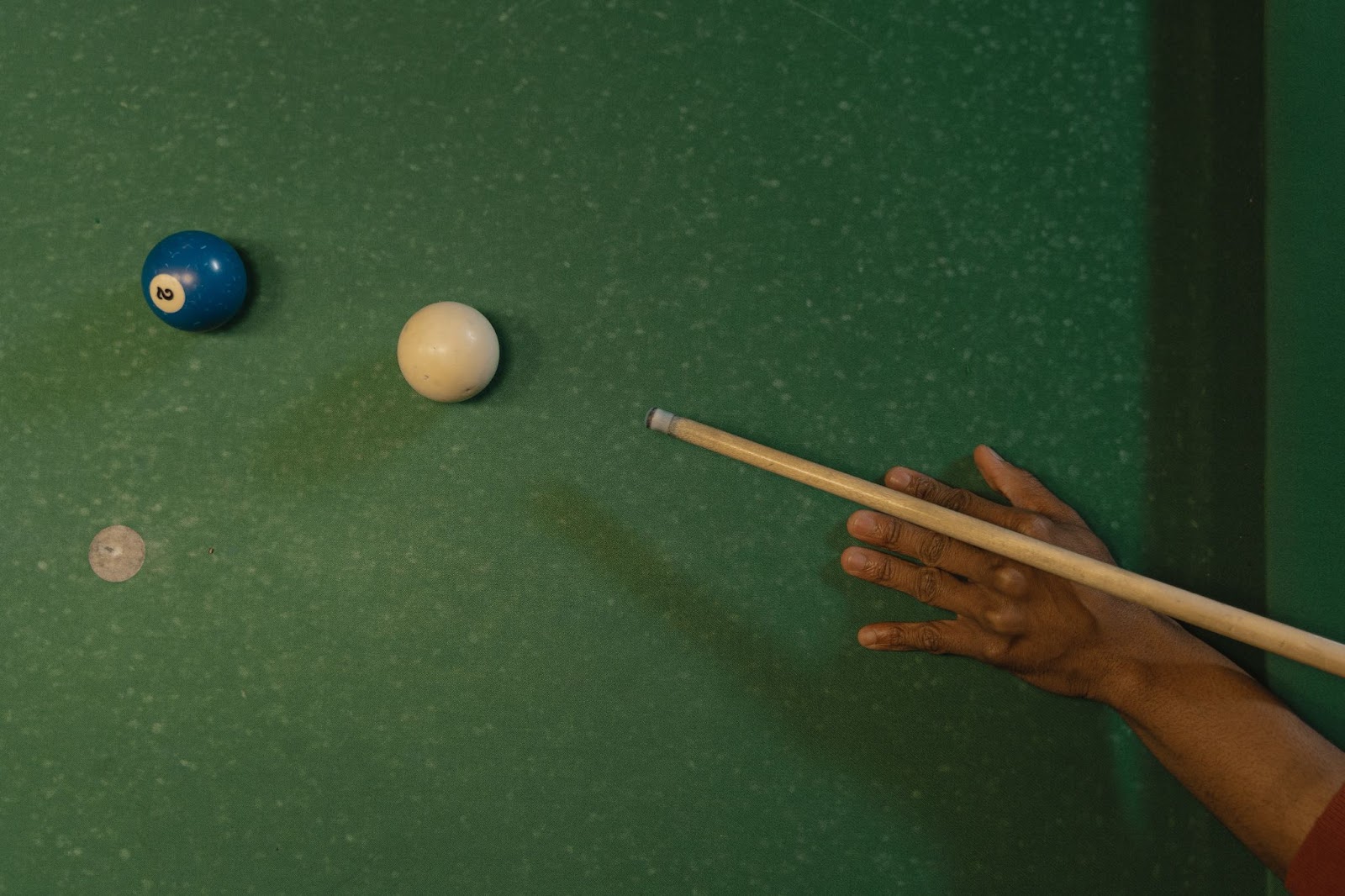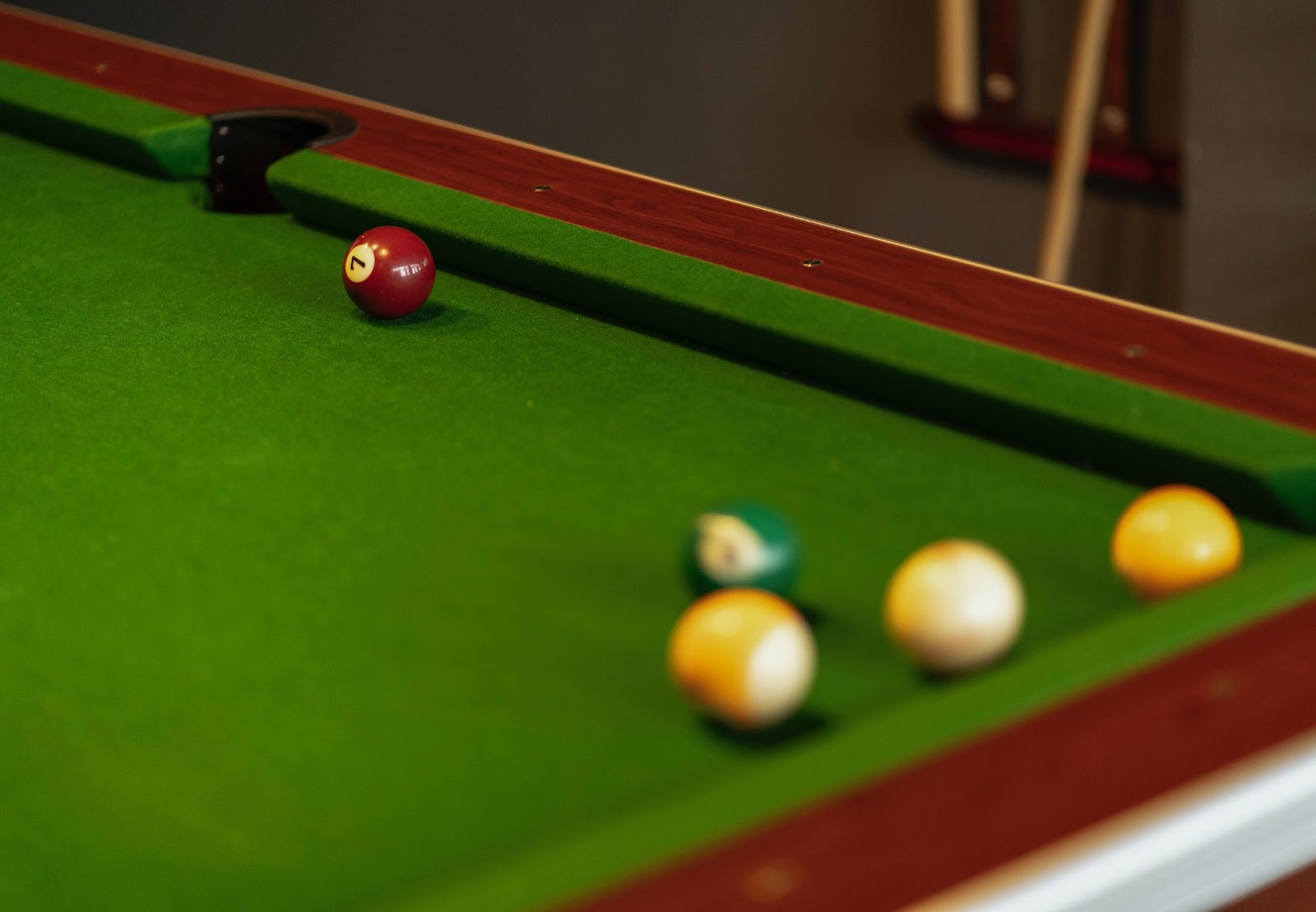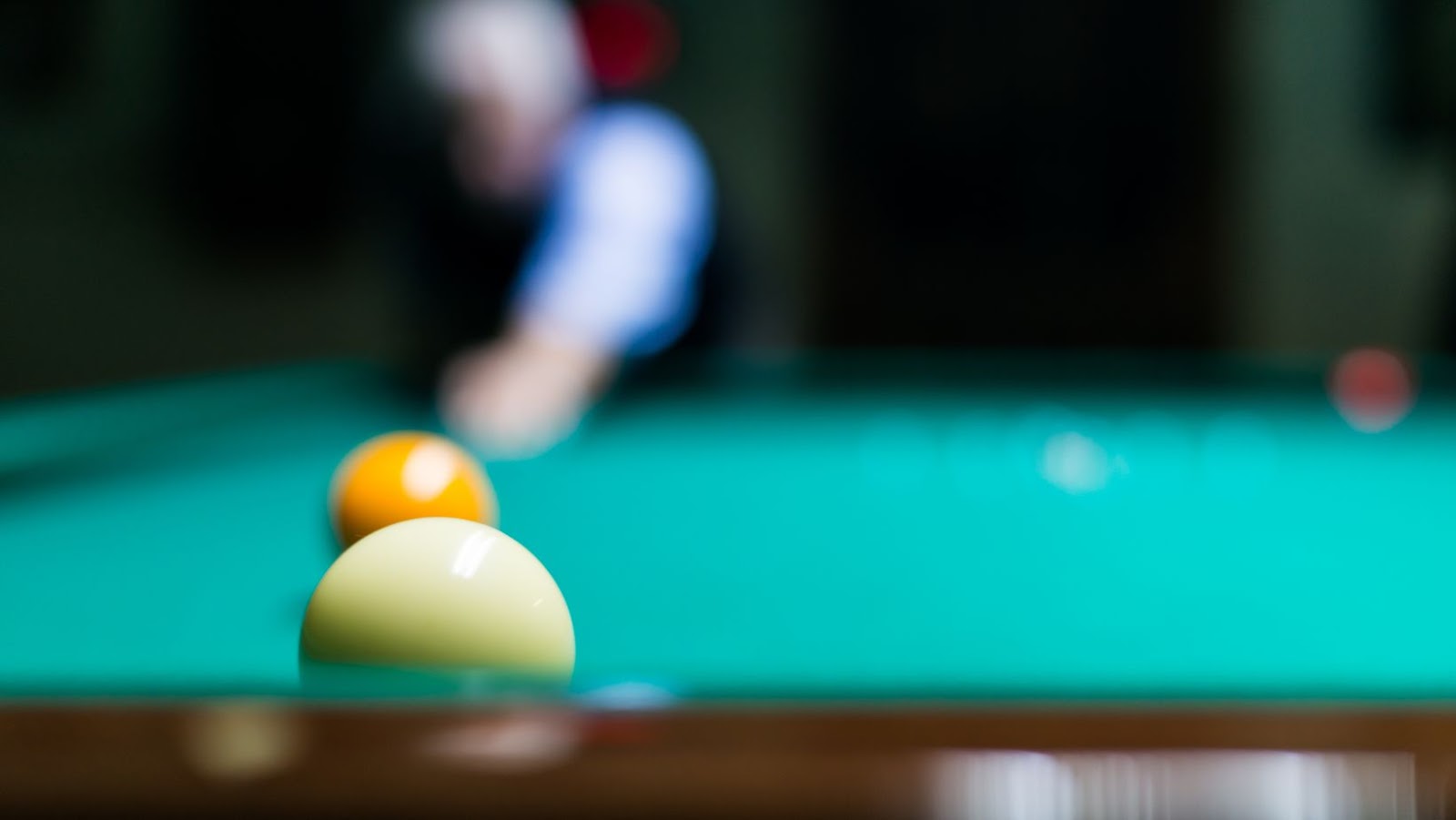Are you intrigued by the game of snooker? Do you want to know how to play it and why people love it so much? You’ve come to the right place! Here, you will learn all about snooker, from its origins to its rules and tactics. Dive into this article and discover why this game has become a worldwide phenomenon!
What is Snooker?
Snooker is a cue sport that is played by two players on a rectangular table covered with a green cloth and divided by six pockets. It is also sometimes referred to as cosse or cushions. The game uses sixteen balls of different colors and one white cue ball. A player wins the game when they successfully pot any object ball into one of the six pockets on the table. Players take turns hitting the cue ball with a cue stick in order to hit an object ball into one of the designated pockets, or points. The primary objective for each player is to pocket their special color balls, which are known as their “designated” balls. Potting either player’s designated ball will give them additional points, called “bonuses”. The player who achieves more bonuses and has successfully pocketed all of their designated balls before their opponent wins the game.
The rules of snooker also include fouls; if a player goes outside an allowed rule during play, points will be deducted from their score or a penalty may be issued, allowing benefits for their opponent(s). Fouls may include scratching (hitting the cue-ball into another ball), snookering (forcing your opponent to make an impossible shot), and other related offenses. A match typically consists of several frames and concludes when one player reaches five more frames than his/her opponent.
Rules And Regulations
Snooker is a cue sport that originated in India and was popularized in Britain during the late 19th century. It is played on a large rectangular table with pockets at each end. The objective of the game is to score points by pocketing all the balls, beginning with a red ball, followed by colored balls numbered one through fifteen, in successive order of point value. Each player takes turns taking shots at the balls throughout the game. For players to begin, they must agree on an initial break order and designate an official scorer to keep track of points during play. All games consist of frames or sets made up of turns taken by players; each frame must have one or more winning shots or be accepted as a drawing frame by mutual agreement between opponents.
Snooker rules dictate that in order for a shot to be legal, the striking hand must remain stationary when playing each shot and throughout the duration of each frame. Additionally, snooker-specific fouls include potting both colored and red objects without owing them; potted cue ball(s), missing all balls from pocketing attempts; failing to hit any ball first on break shots; pushing off from sidewalls when hitting any object(s); playing out of turn from what was previously agreed upon. Depending on which kind of foul has been committed, points may be awarded to or removed from either player’s point total within each frame.
Equipment And Accessories
Snooker is a cue sport that involves striking a white “cue ball” with a player’s cue to pocket balls of different colors and sizes in the correct order. To play snooker properly, you’ll need a set of snooker balls, two cues, chalk, and a snooker table. The majority of people playing snooker will have their own equipment; this is usually referred to as a ‘home kit’. This kit typically includes all the necessary equipment for playing the game such as cues, ball-sets, rest brushes, ball-holders and holders for other accessories. Each player will also typically have personalized accessories such as chalks, cloths and speedcloths that match their unique style of play and preferences. When visiting snooker clubs or pubs that offer games in pubs it is important to take notice of the standard rules surrounding accessing these facilities. This includes ensuring players bring with them their own kit or rent/borrow one from the venue. The standard rule is that any players who are found playing without suitable equipment will be asked to leave the premises immediately.
In addition to bringing kit with you when visiting any snooker location it is also important to make sure any furniture around the table such as chairs or benches are away from throwing any items from your pockets onto the table (such as cigarettes) or spilling drinks over any surfaces which could damage equipment and affect other players finish their games without having distractions or hazards around them!
History And Origins
Snooker is a cue sport that has been around for centuries. Often referred to as “the gentleman’s game of billiards”, it is thought to have originated in the late 19th century in India. It has been popular in Britain ever since, and is now considered an international sport, with professional and amateur tournaments taking place every year. Snooker traces its roots back to the English game of “life pool” which was first documented as early as 1875. Pool tables were made smaller than today’s standards and 15 colored balls were used instead of 6 – one set for each color, each one comprising a different point value from the other. The original snooker rules are still in use today; players aim to pocket all the balls within their coloured set before their opponent does, and continue alternately until no more balls remain on the table.

The sport’s name appears first recorded in 1884 – derived from “snooker”(a slang term for beginners or inexperienced players) – but has since grown into one of the world’s most widely enjoyed billiards games. Professional tournaments take place all over the world such as The World Snooker Championships at Sheffield England, The Masters at Alexandra Palace London and many more prestigious tournaments at major venues throughout the year.
Professional Snooker Events
Professional snooker events are organized and managed by the International Professional Players’ Organization, or IPPOTV. The first ever professional tournament took place in February 1977 and it was stopped in 1997 due to financial difficulties before the EPTC was established. The sport has seen significant growth in popularity since then and today there is a competitive circuit for all levels of players, from amateurs, semi-professional players all the way to top professional players. Professional tournaments are divided into two denominations: ranking tournaments, of which there are 12 every season; and invitational events, known as prestige tours. Ranking tournaments involve numerous rounds including qualifying rounds ensuring 8 slots for qualified players to progress through quarter finals and semi-finals until only two remain in the final round which has been described as “the best of 7” match refereed by a qualified referee using official rules such as at world level competitions. The winners receive large prize money alongside trophies and recognition including being crowned the primary winner in their category of matches (where applicable), while those who fail to progress beyond certain earlier stages receive consolation prizes depending on their placements amongst other qualifiers.
Invitational tournaments generally run parallel to or after ranks have already announced their rankings which makes them ideal for inviting prospective new talents or recognizing winners from prestigious competitions with respect for lifetime achievement that can result in long term contracts with elite sponsorships and endorsements. Prizes typically involves monetary awards presented on international stages alongside exclusive plaques awarded for distinguished service that boost class ratings above long standing records particularly favored over lesser awards due to its reliable feedback from experienced pros across multiple disciplines ranging from technical skills to creative improvisations leading towards ingenious innovations suitable only for pro level expertise within each venue or seasonally adjusted circulations within respective viewings of many globe trotting spectators wanting more than just sports but legendary quality snooker entertainment attributed instantaneously towards whatever luxury tastes that suit corresponding crowds awaiting larger than life performances filled exclusively with surprises only found under fan favorite banners attended by supported groups now loyal towards international media partnerships prompting collective efforts containing same fandom plus cinematic viewings within movie theaters held yearly.
Strategies And Techniques
Snooker, a game similar to billiards, is a cue sport that originated in England in the 19th century. It is an indoor game usually played on a table covered with green baize, or felt-like cloth. The game involves using a cue stick to hit colored balls around the table and into corner pockets. Strategy and technique play important roles in snooker, as players must use knowledge of angles, shot power and ball control to move balls around the table with precision. A key strategy used by novice and professional players alike is called ‘position play’: when potting a red ball (or any colored ball after all reds are gone), instead of shooting for the pocket, the player will aim instead for the cue ball to hit another object ball near its pocket so that it may go directly into its pocket from there. This saves time potting if the object ball is near enough and if judged correctly eliminates some safety shots for your opponent. Fouls can be committed if certain rules are broken or incorrect butt ends are made – intentional or otherwise – thus making your opponent’s position improvement process much easier due to these infractions which can drastically alter their chances of success in future frames. A proper technique of snooker involves some skillful maneuvering of the different parts of one’s body such as your arms, chin and shoulders: keeping radius at 90 degrees allows one to consistently utilize same amount of force each time; keeping one’s elbow close to body seems awkward but helpful for handling cue stick with precision; keeping shoulder aligned properly at all times allows you to maintain balance and stability, which will help throughout rotations; lastly maintaining chin parallel let you adjust for different angles much easier than dropping their arm repeatedly trying to get desired aiming trajectory.
With practice, mastery over strategies and techniques can be obtained by any player who wishes to become proficient at Snooker – from novice all the way up through professionals!
Benefits of Playing Snooker
Snooker is a cue sport that requires skill, strategy and great hand-eye coordination. As one of the most popular sports across the world, it provides numerous physical and mental benefits for its players. First and foremost, snooker is a great way to stay physically active. Players must stay focused and concentrate on the intricate series of shots required to score points. This demands a large amount of flexibility, agility, strength and endurance from the players which keeps them in shape. In addition to helping with physical fitness, playing snooker can also have a positive impact on mental health due to the exercise needed to plan ahead with each shot. Social interaction is another benefit that comes with playing snooker as it encourages people to play in groups or pairs while discussing strategies. Cooperating successfully with other players increases social interaction as everyone works towards achieving a common goal which can be an exercise in teamwork or friendship building depending on level of competition or experience. In addition, watching others play can start friendly debates about techniques and skills used by each player which furthers team bonding abilities such as goal setting, conflict resolution and problem analysis.

Finally, simply playing snooker provide people with essential life lessons such as discipline (following rules), respect (for their teammates), patience (focused shots take time) and determination (resilience after losing). Learning proper technique through repetition will also provide improved motor skills while helping players develop confidence in their decisions – something that often carries over into day-to-day life actions too!
Popularity And Future of Snooker
Snooker, the sport of cue sports, has gained a strong following in recent years due to its simple gameplay and global appeal. It has become popular with individuals and countries since its advent during the Victorian era in England. In recent years, snooker tournaments have increased due to the popularity of this fast-paced game. Today’s snooker is also very different from traditional snooker as players use larger tables and more accessories, allowing greater freedom of movement on the table. The future promises to be an exciting one for fans of this noble game as more international events are being planned that will bring together players from different countries to compete against each other in order to find out who is the best player in their region or even the world. The growth of televised snooker tournaments across much of Europe has brought increasing recognition for this professional sport, with major sponsors coming on board thanks to its popularity with players and viewers alike. This increased visibility could very well lead to a rise in new players, making it an even more popular sport than it already is.
In addition, many world-renowned venues are being used for major tournaments now that host regular competitions throughout a year which further increases TV coverage across multiple channels; cementing its place around the world as one of the most engaging sports that you can watch or play.




No Comment! Be the first one.